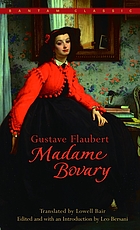“There is a hunger that all the treasures of the world cannot satisfy . . . There is a thirst that all the streams of overabundance cannot quench.” –Kierkegaard
I discovered so many patterns, themes, and techniques while reading Madame Bovary, that it was difficult to focus on just one. What kept coming back to me, however, was the theme of eating and drinking. There is so much focus by Flaubert on Emma’s lips, mouth, tongue, and teeth. When we first meet Emma she is sucking the blood out of her own fingertips, which she has pricked with a sewing needle (just as the wedding bouquet will later prick her, and the cactus Leon buys for her pricks him). Flaubert writes: “Charles noticed that her lips were full, and that she had the habit of biting them in moments of silence.” (19) Later, when Charles returns to the house to check on Emma’s father’s progress (whom he has operated on) Flaubert uses dazzling imagery in the depiction of Emma sitting in a sunlight-slatted kitchen, sewing “between the window and the hearth” (26) She offers Charles a drink of liqueur, and interestingly pours a full glass for him and “a few drops” in her own:
Because it was almost empty she had to bend backwards to be able to drink; and with her head tilted back, her neck and her lips outstretched, she began to laugh at tasting nothing; and then the tip of her tongue came out from between her small teeth and began daintily to lick the bottom of the glass. (26)
Emma pours herself so little liqueur out of obedience to the customary conventions of her society. Flaubert uses this image as a precursor to what will follow throughout the rest of the novel: Emma’s spiritual thirst and ultimate starvation. Food and drink then, as I see it, represent the unattainable, unreachable, spirituality that all of the characters are oblivious to except Emma. It is her heroic effort to quench this profound thirst that makes her character ultimately redeemable. The real tragedy of the novel is not Emma’s death but rather the inability for her or anyone else to fulfill her spiritual need.

The Bantam Classic paperback from 1982, translated by Lowell Bair
Everyone in the novel eats. Decadence does not escape the bourgeoisie. Even the horses are “stuffed with oats to the bursting point.” (34) Emma feeds the flames of her image of Leon, and eventually they die down, “whether exhausted from lack of supplies or choked by excessive feeding.” (146) Her attempt to feed her spiritual hunger through an affair with Leon will prove unsuccessful. During an early period when Emma is still happy, Flaubert writes: “Emma had her dinner brought to her in her bedroom on a tray, and ate it beside the fire. She lingered over her food: everything tasted good.” (124) In one of the book’s great passages, the doctor Homais and the priest Bournisien have fallen asleep in the room with Emma’s corpse, whom they both have failed: “They sat opposite one another, stomachs out, faces swollen, both of them scowling–united, after so much dissension, in the same human weakness…” (392). Later the two have a meal together and are temporarily friends, not enemies, while satiating themselves of their hunger. Homais says he’d “gladly partake of some nourishment” and a brief unity is formed:
The priest didn’t have to be asked twice. He went out, said his Mass, came back; and they proceeded to eat and clink their glasses, chuckling a little without knowing why, prey to that indefinable gaiety that often succeeds periods of gloom. With the last drink of brandy the priest slapped the pharmacist on the back: “We’ll be good friends yet!” he said. (393)
Emma has a deeper and more profound spiritual hunger than anyone else in the novel. Even on her deathbed, after all the affairs that she hoped would fulfill her childhood fantasies, she cries, “I’m thirsty! I’m so thirsty!” (372) It is Emma’s deep spiritual hunger that leads her to, in a sense, consume herself. Consistent with this idea is the way in which Emma kills herself: by eating aresenic “greedily” out of the can that Justin has so tragically and ignorantly procured for her. Hunger is an appropriate metaphor for human spiritual need for several reasons, the most significant being that it is unconscious and it is constant. Hunger happens to us regardless of our situations, our feelings, our social status, or our beliefs. All men are subject to hunger; sooner or later it comes calling from his belly, and he is driven to do something about it. Flaubert’s suggestion, then, is that Emma’s need for spiritual fulfillment, though distinct in its profundity, is a reflection of all humanity.
What distinguishes Emma from all the other characters in the novel (and in her society) is that she is not afraid to sin in order to attain the spiritual nourishment that her soul thirsts for. Nor is she afraid to die. In fact, Flaubert offers a stark contrast between the way Emma faces her own death, laughing at the song of the blind beggar, and the pathetic way that Homais cuts off a lock of her hair to give to Charles as a keepsake: “He trembled so violently that he nicked the skin on the temples in several places. Finally, steeling himself, Homais slashed blindly two or three times, leaving white marks in the beautiful black tresses.” (393)
When she is driven to use her sexuality as a bargaining chip to attain the 3,000 francs she needs to pull herself out of debt and avoid being completely exposed, Flaubert states that she is “unaware that now she was eager to yield to the very thing that had made her so indignant only a short while ago, and totally unconscious that she was prostituting herself.” (363) The question, then, is this: is Emma’s corrupt morality the result of conscious choice or a byproduct of her spiritual instinct? The words “unaware” and “totally unconscious” lead one to believe that it is the latter.

Sophie Barthes’ 2014 film, starring Mia Wasikowska
Madame Bovary is a story about society’s inability to fulfill a spiritual need that it has itself created. The battle between medicine (science) and religion ends in the utter failure of both to relieve the suffering that the characters experience, most notably Emma. The failure, we begin to see, is the result of trying to solve something that is not meant to be solved. Emma’s desperate attempts to escape her own human condition lead to the resolution that there is no escaping the human condition. Hippolyte’s leg is ultimately a symbol for that thing in nature that is only adulterated by our attempt to destroy it.
Finally, Flaubert puts language (himself an artist of words) in the same category as religion and science. He recognizes that all of them are inventions of man and therefore utterly limited as a rule in their capacity to transcend what is human. There are two scenes where Emma tries to communicate with authorities in each class, first with the priest, and later with Homais. Emma is at a loss as far as how to express her spiritual need to the priest. She can only say what it is not: “It isn’t earthly remedies that I need.” (132) Religion has been put into the same category as medicine: both are used merely to relieve suffering. As the priest puts it, referring to Charles: “‘He and I are certainly the two busiest people in the parish. He takes care of the bodies,’ he added, with a heavy laugh, ‘and I look after the souls.’” (133) Religion is a complete failure, then, for not only does it provide a practical channel for the individual to connect with God, but it cannot even relieve the suffering of the soul, which it proclaims to do.
Religion does no better with individuals than medicine did with Hippolyte’s leg: both fail utterly, and yet language is at the root of both. It is language that is the great poison, the arsenic of the world, and this is Flaubert’s ultimate irony. Language has created a God that man cannot reach (just like Kafka’s castle) and romantic fantasy ideals that will never be attained. As Flaubert himself says, on page 224: “None of us can ever express the exact measure of his needs or his thoughts or his sorrows; and human speech is like a cracked kettle on which we tap crude rhythms for bears to dance to, while we long to make music that will melt the stars.”